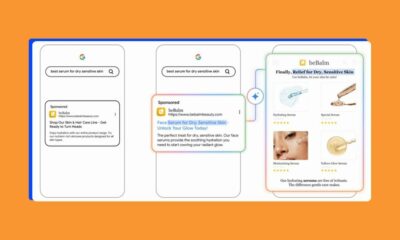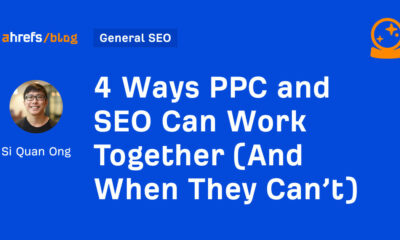SEO
7 PPC Community & Google Team Insights
Google has added many automated tools over the past years including Smart Bidding, Responsive Search Ads, and close variant keywords.
Performance Max campaigns are the latest addition to this increasing list of automated PPC tools.
And it might be the most revolutionary campaign type so far in Google Ads.
Performance Max campaigns let advertisers promote their products & services across all of Google’s advertising channels – YouTube, Display, Search, Discovery, Gmail, and Maps from a single campaign.
Traditionally, to run ads on all of Google’s networks, you needed different campaigns and creatives for each channel.
But Performance Max rolls all of that into one campaign, simplifying the effort to reach customers.
It’s a fairly new campaign type, so best practices are still evolving.
To help build more knowledge around this topic, I recently spoke to product team members at Google who built Performance Max. (You can watch the full PPC Town Hall episode below.)
From early best practices to their roadmap, they shared a great deal and even answered several questions I had collected from the PPC community.
Here are some takeaways about Performance Max campaigns.
1. Performance Max Takes Priority Over Other Shopping Campaign Types
If you’re running a Performance Max campaign alongside a shopping or a smart shopping campaign for the same product (or groups of products), the Performance Max campaign takes precedence.
That means the Performance Max campaign ads will show to users instead of the ads from the Smart Shopping Campaign.
This is similar to how Smart Shopping campaigns are prioritized over Standard Shopping campaigns when running simultaneously.
When Smart Shopping campaigns upgrade to Performance Max by the end of Q3 in 2022, they will continue to be given priority over standard shopping campaigns.
When you upgrade a smart shopping campaign to Performance Max, your ads will serve on other channels such as Search, Display, Discover, YouTube, and Gmail by default.
So when making the transition, you should definitely revisit and review your creative assets to make sure they are all set up correctly.
2. Upgrading Smart Shopping To Performance Max Doesn’t Mean You Have To Advertise On All Channels
If you’ve loved the convenience of Smart Shopping campaigns and don’t like the prospect of your ads serving in more places, you’re not required to add all assets to a Performance Max campaign.
If you connect your merchant feed but don’t provide any other assets such as a video, images, and text, your Performance Max campaign will only serve shopping ads.
Ginny Marvin, Google’s Ads Liaison said,
“For shopping, when you link a GMC feed to a Performance Max campaign, but add no other assets, the campaign will be eligible to serve Shopping formats across Search, Display, YouTube, and Gmail.”
This points to a broader tip: While there is no way to select which channels you want ads from Performance Max to appear on, you can achieve this to some extent by being selective about which assets you add to the campaign.
3. Keywords From Search Campaigns Take Priority Over Performance Max Targeting
While Performance Max cannibalizes traffic from shopping campaign types, it is intended to run alongside your existing search, display, and YouTube campaigns. They are designed to be less cannibalistic in those scenarios.
When running a search campaign alongside Performance Max, Google will first try to show ads from the search campaigns.
Ginny Marvin said,
“If the keyword is identical to the query (or spell corrected), Search will be prioritized. Otherwise, prioritization is based on Ad Rank. The keyword must be eligible.”
The key here is about “eligibility.”
If an advertiser has tried a keyword without success and removed it or added it as a negative keyword in their search campaign, the Performance Max campaign may still decide to show an ad for it.
The search campaign wasn’t eligible to show an ad, so the Performance Max campaign filled in with incremental traffic.
Whether it decides to step in depends on whether it believes the incremental impressions can lead to the advertiser reaching their stated goal at the specified target.
And that leads to our next learning.
4. Reporting Accurate Conversion Data To Performance Max Yields Higher Quality Conversions
Google says that Performance Max is primarily a performance-driven campaign type with conversion goals as its target. Like all automation, it makes decisions informed by conversion data you feed into the system.
So when you set up a Performance Max campaign, make sure to report the kind of conversions that matter for your business.
Instead of calling a lead a conversion, consider only reporting a conversion when a lead is qualified or when it turns into a sale.
In the case of ecommerce, consider not just reporting sales but also using conversion adjustments to account for returns and repeat purchases that may affect the lifetime value of a new customer.
Google has recently introduced Enhanced Conversions for Leads which makes reporting high-quality conversion data easier than ever.
5. You Cannot Allocate Specific Budgets To Channels
In a Performance Max campaign, you cannot allocate budgets to specific channels yourself.
But Google’s machine learning takes care of that dynamically in real-time across all channels. It tries to optimize for your stated goal and prioritizes the channels that best help it achieve that goal.
According to Google, manually allocating budgets constrains Google’s ability to use its machine learning powers.
If you set monthly budgets manually across specific channels, you’re basically returning to regular search, display, and other campaigns that may be already running in your account.
But remember the trick about selectively submitting assets to a Performance Max campaign to control which channels it can show ads. This, along with running multiple Performance Max campaigns, can restore some control.
Ultimately, ask yourself why you want that control, though.
Andrew Lolk said in another PPC Town Hall episode that when advertisers demand control, they often really mean they want actionable insight.
Advertisers are happy when automation drives good results but get frustrated when they can’t explain those results to clients and offer strategic advice.
Google promises to build more insights for Performance Max campaigns.
6. You Can Optimize For Getting New Customers Using The New Customer Acquisition Feature
One complaint of another automated campaign type, Smart Shopping, was that it would sometimes prioritize remarketing and take credit for conversion from someone already in your pipeline, perhaps due to a non-PPC effort like SEO.
In these cases, the automated campaign may be overstating its own utility and do a poor job of growing a business with new customers.
You can avoid this by telling Google to focus on new customers and by sharing your first-party data about who your existing customers are.
And to help you with that, Google released a New Customer Acquisition goal beta through which you can optimize for new customer acquisition and maximize performance from that audience segment.
To get access now, you can reach out to your Google Ads representative or wait for the impending public launch of this new capability.
7. Account Level Negative Targeting Is Supported
While Google doesn’t want advertisers to micromanage targeting, Performance Max campaigns will respect account-level negative keywords and negative placements.
Some advertisers have said it can be beneficial to exclude undesirable geo locations or, at the very least, think very carefully about settings like whether you target physical locations or locations of interest.
Automation can make many guesses to find new pockets of conversions but waste a lot of money in the process.
When you have already tried certain keywords, placements, or geo targets and haven’t found them to work, use the exclusion capabilities to forbid the automation from testing these things again at your expense.
Conclusion
Performance Max campaigns show a lot of potential for advertisers, but they are radically different from the other campaign types we’re more familiar with in Google Ads.
A whole new set of best practices will evolve as more advertisers try this new campaign type.
But until then, we’re learning all we can by asking Google questions and listening to digital marketers who’ve already tried their hand at Performance Max.
Watch the full April 13, 2022, episode of PPC Town Hall for more:
More resources:
Featured Image: Sammby/Shutterstock
!function(f,b,e,v,n,t,s)
{if(f.fbq)return;n=f.fbq=function(){n.callMethod?
n.callMethod.apply(n,arguments):n.queue.push(arguments)};
if(!f._fbq)f._fbq=n;n.push=n;n.loaded=!0;n.version=’2.0′;
n.queue=[];t=b.createElement(e);t.async=!0;
t.src=v;s=b.getElementsByTagName(e)[0];
s.parentNode.insertBefore(t,s)}(window,document,’script’,
‘https://connect.facebook.net/en_US/fbevents.js’);
if( typeof sopp !== “undefined” && sopp === ‘yes’ ){
fbq(‘dataProcessingOptions’, [‘LDU’], 1, 1000);
}else{
fbq(‘dataProcessingOptions’, []);
}
fbq(‘init’, ‘1321385257908563’);
fbq(‘track’, ‘PageView’);
fbq(‘trackSingle’, ‘1321385257908563’, ‘ViewContent’, {
content_name: ‘google-on-performance-max’,
content_category: ‘paid-media-strategy pay-per-click ‘
});



















You must be logged in to post a comment Login